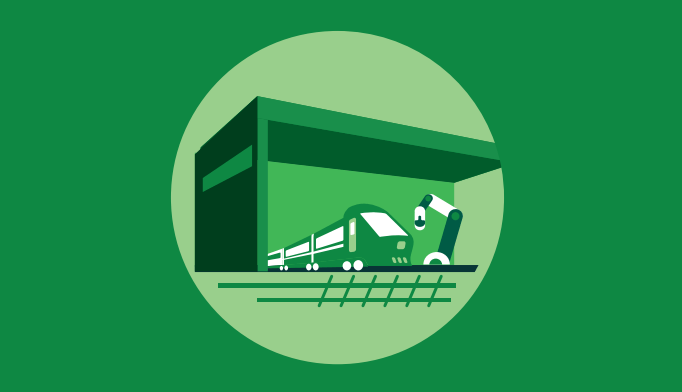UNIFE Presiding Board calls on European policy-makers for clear arbitrations to secure a green future
We, Members of the Presiding Board of the European Rail Supply Industry Association (UNIFE), want to share our concerns regarding a series of recent alarming developments which have been met with disbelief within our industry and created the perception that rail may not have its rightful place on the EU political agenda.
This may sound surprising, especially a few weeks only before the launch of the European Year of Rail. Difficult to believe even, especially when considering the essential role that our industry plays for both achieving the European Green Deal objectives and contributing to our continent’s economic recovery – the two main political priorities of the EU.
Without the decarbonisation of transport, the climate-neutrality target of the Green Deal will never be reached. Rail is the only transport mode which has reduced its emissions, while increasing passenger and freight volumes and improving its energy efficiency. Rail is the most carbon-efficient motorised transport mode! Therefore, there will be no successful Green Deal without an ambitious pro-rail EU Transport Policy with modal shift targets at its core.
In this context, it is very difficult for us to understand how the European Institutions came up this year with a series of decisions which appear in total contradiction with the EU’s political objectives. This started during the spring with the exclusion of rail from the “Green Deal Call” under Horizon 2020, even though our industry has always been committed to demonstrating its extraordinary innovation capacities, notably to make rail ever cleaner and more efficient, with strong and lasting societal and economic impacts.
Then, at the end of July, the European Commission proposed to significantly reduce the EU subsidy to be granted to the European Union Agency for Railways (ERA) for the year 2021 while recognising at the same time that the role of the Agency would be “substantially extended” “with the entry into force of the Fourth Railway Package technical pillar”.
More recently, we learnt, to our great surprise, that the European Commission selected 50 organisations to be part of the new EU Platform on Sustainable Finance, but not a single one from the rail sector despite at least 6 applications submitted.
Less than 10 weeks before the launch of the European Year of Rail, we call on the European Institutions to bring back consistency between words and actions for a series of key initiatives where crucial decisions are to be taken soon:
The new European Strategy on Sustainable and Smart Mobility
Knowing the performance of rail in terms of GHG emissions and energy efficiency, how will the EU be able to reach its Green Deal objectives if rail continues to carry only 11.3% of inland freight and 8.4% of passengers in Europe? Therefore, we firmly stand behind the public commitment of Commission President Ursula von der Leyen in front of the European Parliament to “shift a substantial part of the 75% of inland freight carried today by road onto rail and inland waterways”. But this modal shift must now become a reality and must be clearly enshrined in the upcoming Commission’s Strategy.
EU and national investment programmes for rail
Such pro-rail policy vision shall also be concretely translated into ambitious EU funding programmes earmarked for rail infrastructure, ERTMS deployment and acquisition of modern, energy-efficient and zero-emission rolling stock. In this respect, we also count on the European Commission to push all Member States to dedicate massive investment for rail in their national Recovery and Resilience Plans.
Transforming Europe’s Rail System European Partnership
We call once again on the European Commission to propose an ambitious Shift2Rail-2 Programme with an EU contribution of €1.5bn under Horizon Europe. The European rail supply industry has been constantly innovating to improve the quality of its products and decrease the overall life-cycle cost of the railway transport system, but we need more than ever such financial support of the European Commission to help us stay at the forefront of the green and digital transition.
Global level-playing field
Ensuring international market access and global level-playing field is more essential than ever for an export-oriented industry that faces increasing protectionism and a fierce and unfair competition from Asian State-owned manufacturers all over the world and increasingly in the EU. Besides the much-needed adoption of the International Procurement Instrument (IPI) by the Council and the European Parliament, we now count on the Commission to propose an instrument on foreign subsidies that effectively tackles the issue of access of foreign State-owned companies to European procurement markets.
To conclude, rail is the only area where structural investment can contribute by the same token to a series of essential targets, be it a stronger internal market (through cross-border connectivity), job creation (with our 400 000 jobs!), territorial & social cohesion (by building bridges between rural and urban areas as well as between city centres and deprived neighbourhoods) and of course a smart, digital and sustainable mobility system that reconciles performance and reduction of CO2 emissions. Let us not disappoint the young generation who rightly sees us as the key mobility provider of the green future they deserve.
